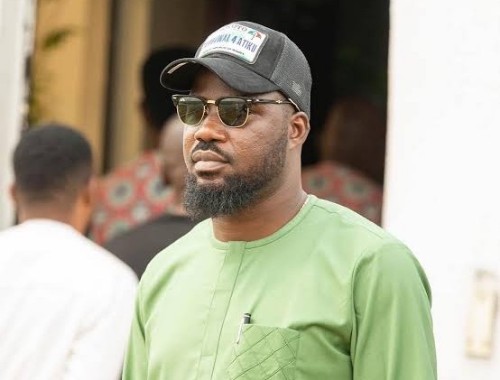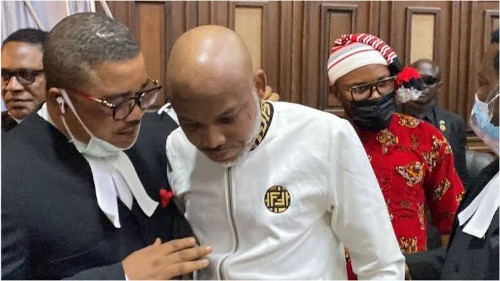President Bola Tinubu on Sunday concluded his tenure as Chairperson of the Economic Community of West African States (ECOWAS) Authority of Heads of State and Government.
Following this, President Julius Maada Bio of Sierra Leone was named as his successor.
Tinubu made the announcement during the 67th Ordinary Session of the Authority held at the Aso Rock Villa in Abuja.
He said, “It has been a profound honour and privilege to lead this esteemed body, and I remain deeply humbled by the trust and support you have extended to me throughout my channel as I now hand over the mantle of leadership to my great friend and dear brother, His Excellency, President Julius Bio of Sierra Leone.”
“I do so with a deep sense of fulfilment and of commitment for the future of West Africa.”
Before the handover, Tinubu voiced concern about the delay in activating the ECOWAS Standby Force and encouraged West African leaders to transition swiftly from planning to implementation in addressing terrorism and transnational crime.
“I am a little bit worried about the slow pace of its (ECOWAS Standby Force) activation, which is taking longer than desired,” the President said in his opening remarks.
In April 2024, Tinubu initially advocated for a regional standby force and a counter-terrorism centre to curb terrorism in Africa’s most vulnerable regions.
He described the counter-terrorism centre as a central point for intelligence sharing, coordination, and capacity building across the continent.
He identified ransom-taking and illegal mining as “evil branches” stemming from “root causes” such as poverty, inequality, and social injustice, which fund and sustain terrorist operations continent-wide.
“Key to our collective efforts against terrorism is the urgent need for a fully operational Regional Counter-Terrorism Centre,” Tinubu said at the African High-level Meeting on Counter-Terrorism in Abuja on April 22, 2024.
During the sixth Mid-Year Coordination Meeting of the African Union in Ghana two months later, he noted that ECOWAS was considering alternative funding strategies for the $2.6 billion Standby Force.
In August of that year, he reaffirmed the commitment of member states to fund the force, labeling it a key solution to terrorism in the Sahel region.
However, a year later, Tinubu, reflecting on his leadership since July 2023, expressed dissatisfaction with the progress as security challenges persisted in the Sahel.
He emphasized the urgent need to make the force operational amid increasing insecurity throughout the region.
“The ECOWAS Standby Force must move from concept to operational reality. I am a little bit worried about the slow pace of its activation, which is taking longer than desired,” the President repeated.
He pointed out that the region’s threats were transnational, propelled by agile and dangerous groups that disregard borders.
“No single nation can, therefore, address these challenges alone. We must strengthen coordination, amplify political will, and prioritise a collective approach to secure it,” he said.
Tinubu highlighted key achievements during his leadership of ECOWAS.
He mentioned the completed ECOWAS Military Logistics Depot in Lungi, Sierra Leone, as a vital facility for supplying logistics and equipment to ECOWAS-deployed forces.
“Last February in Addis Ababa, Nigeria signed the Sixth Agreement with the African Union. With the depot’s completion, Nigeria is committing itself to sea-lift and air-lift arrangements with ECOWAS,” he said.
He expressed optimism that diplomatic efforts with Burkina Faso, Mali, and Niger would lead to their return to the ECOWAS community.
“Under my chairmanship, I deployed all diplomatic means to engage and dialogue with our brothers in Burkina Faso, Mali, and Niger. I am confident that before too long, they may return to the family,” he said.
Tinubu urged for deeper economic cooperation, strengthening the private sector, and eliminating trade barriers to unlock the region’s full potential.
“Our intra-regional trade remains low, even as we possess the potential to be an economic powerhouse. We must create the enabling environment, empower the private sector, and create the conditions necessary for innovation to flourish,” he said.
He also called for rapid implementation of regional infrastructure projects, including the West African Gas Pipeline, West African Power Pool, and Abidjan–Lagos Corridor Highway, which he described as development and integration catalysts.
After the handover, President Bio praised Tinubu for building a strong base for regional dialogue, economic growth, and peacebuilding.
“I am humbled to build upon the strong foundation you have established,” he said, acknowledging Tinubu’s “experience and leadership.”
He noted that the region faced complex challenges such as terrorism, arms trafficking, political instability, and transnational crime, particularly in the Sahel and coastal states.
“The democratic space is under strain in parts of our region. In some countries, the constitutional order has been disrupted.
“Yet, across West Africa, citizens—especially our youth—are demanding not just elections, but also accountability, transparency, and a fair stake in national life,” he said.

 BIG STORY4 days ago
BIG STORY4 days ago
 BIG STORY4 days ago
BIG STORY4 days ago
 BIG STORY1 day ago
BIG STORY1 day ago
 BIG STORY4 days ago
BIG STORY4 days ago
 BIG STORY4 days ago
BIG STORY4 days ago
 BIG STORY5 hours ago
BIG STORY5 hours ago
 BIG STORY1 day ago
BIG STORY1 day ago
 BIG STORY3 days ago
BIG STORY3 days ago






















